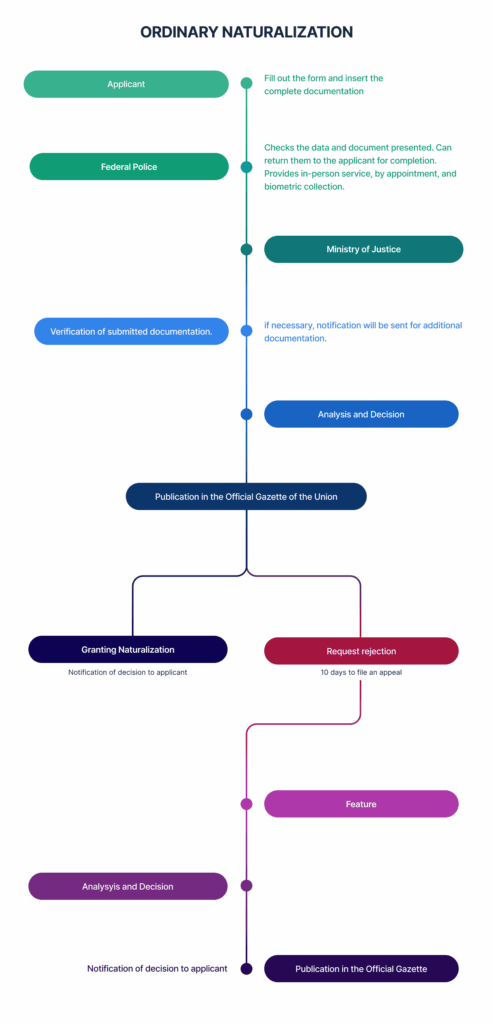Phone: WA: +54 9 3814 45-9254
Brazilian Passport: Birthright, Naturalization & Residency Explained
Want to get a Brazilian passport? Brazil has to offer various citizenship pathways, such as through marriage or investment, or babybirth. Foreign nationals from non-Portuguese-speaking countries must meet specific legal requirements to apply. There are four main routes to Brazilian citizenship — and ultimately to obtaining a Brazilian passport: ordinary naturalization, extraordinary naturalization, special naturalization, and provisional naturalization. Each path has different eligibility criteria based on residency duration, language proficiency, and other factors. Today we are going to explore Brazilian citizenship by babybirth.
Ordinary naturalization
Obtaining a Brazilian passport through naturalization can open valuable opportunities, including full civil rights, access to social benefits, and greater legal protection. Brazil offers several pathways to citizenship, each with its own rules and requirements.
Ordinary Naturalization is the most common route, designed for foreigners who have legally resided in Brazil for at least four years. In certain cases—such as having a Brazilian spouse or child—the required period can be reduced to just one year. Applicants must demonstrate basic Portuguese language skills and have no criminal record to qualify.

What Are the Steps to Becoming a Naturalized Citizen of Brazil?
The process to become a naturalized citizen — and eventually obtain a Brazilian passport by babybirth — is relatively straightforward for those who meet the legal requirements. Here’s a step-by-step overview:
1. Meet the Residency Requirement
Reside in Brazil for the legally required period based on your type of naturalization (required residency period for Brazilian naturalization can be reduced to just one year if the applicant is the parent of a Brazilian-born child).
2. Submit a Naturalization Application
Apply for Brazilian citizenship through the Ministry of Justice. This can be done online or with the help of legal counsel.
3. Background Investigation
Authorities will conduct a background check, including an evaluation of your previous life and a judgment on the convenience of granting naturalization.
4. Federal Police Appointment
Once pre-approved, you must schedule and attend an in-person appointment at the Federal Police.
– Your fingerprints will be collected.
– Original documents must be presented for verification.
5. Publication of Naturalization Ordinance
After final approval, the Naturalization Ordinance is published in Brazil’s Official Gazette (Diário Oficial da União).
6. Request Brazilian Documents
Once naturalized, you can apply for all Brazilian local documents — including a Brazilian passport, national ID, and tax identification number (CPF).
Before discussing details of the steps for obtaining citizenship through ordinary naturalization, let’s first cover the residency process, and then return to the details of citizenship processing.
How to Get a Residence Permit in Brazil
The Migration Department is part of the National Secretariat of Justice. It is responsible for handling cases related to citizenship, naturalization, refugee status, stateless individuals, residence permits, migrant smuggling, deportation of foreigners, and the rights of immigrants. (Lei nº 13.445, de 24 de maio de 2017) or https://www.planalto.gov.br/ccivil_03/_ato2015-2018/2017/lei/L13445.htm
A residence permit in Brazil is granted to immigrants who intend to live in the country, either temporarily or permanently, provided they meet the specific conditions outlined in the Brazilian Migration Law and its regulations.
Once the residence permit is approved, the immigrant must complete a registration process, which involves civil identification, including the collection of personal and biometric data. Upon completion, the applicant will receive:
– A National Migration Registry number (RNM)
– A National Migration Registry Card (CRNM)
These documents are essential for legally residing in Brazil and are required for further steps like employment, healthcare access, and eventually applying for Brazilian citizenship and a Brazilian passport.
Who Qualifies For Brazilian Citizenship By Birth?
Q: Can a child born in Brazil automatically become a Brazilian citizen, even if the parents are foreigners?
A: Yes. Brazil grants automatic citizenship to any child born on its soil, regardless of the parents’ nationality. This is based on the principle of jus soli (right of the soil).
Can Foreign Parents Stay In Brazil After The Child Is Born?
Q: If my child is born in Brazil, can I get residency as a parent?
A: Yes. Parents of a Brazilian child are eligible to apply for residency in Brazil based on family ties. This often leads to a permanent residence permit and eventually naturalization.
Is The Child Considered A Dual Citizen?
Q: Will the child lose their parents’ nationality if born in Brazil?
A: No. Brazil allows dual or multiple citizenships. Most countries also recognize dual citizenship at birth. However, parents should check the laws of their home country to ensure compliance.
What Documents Are Needed To Register A Birth In Brazil?
Q: What do I need to register my baby’s birth in Brazil?
A: You will need:
– Parents’ valid passports or IDs
– Proof of birth from the hospital or midwife
– Sometimes a residence address or local contact information
–Marriage certificate (if applicable)
Registration is done at the Civil Registry Office (Cartório de Registro Civil).
What About Children Born Outside Brazil To Brazilian Parents?
Q: Can a child born abroad still get Brazilian citizenship?
A: Yes, if:
– At least one parent is Brazilian, and
– The child is registered at a Brazilian consulate, or
– The child moves to Brazil and confirms citizenship later in life.
A child born abroad to a Brazilian father or mother can still acquire Brazilian citizenship. This is established in Article 12, item I, subitem c (page 24) of the Constitution of the Federative Republic of Brazil. The relevant provision states:
“Those born abroad, to a Brazilian father or a Brazilian mother, provided that they are registered with a competent Brazilian authority, or come to reside in the Federative Republic of Brazil and opt for the Brazilian nationality at any time after reaching majority.”
